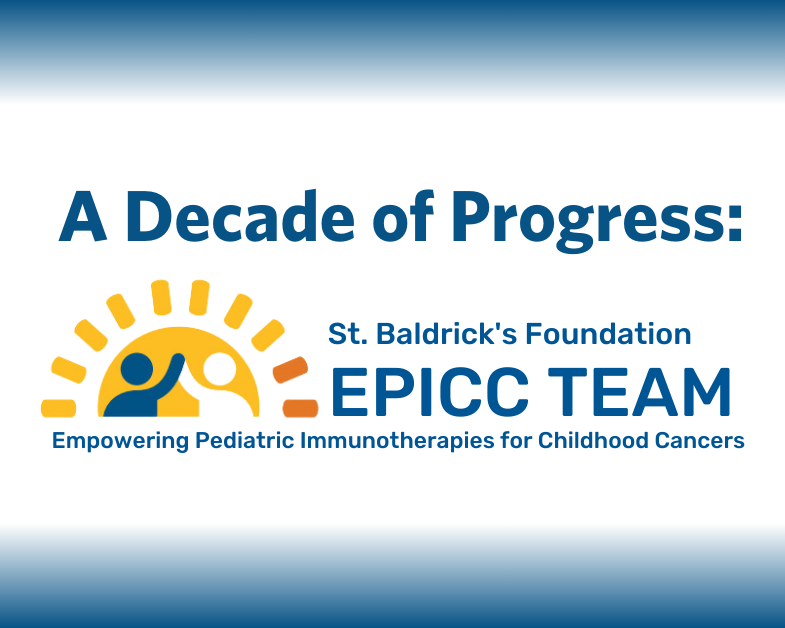
Something extraordinary began in 2013: the first ever pediatric cancer “Dream Team,” funded by the St. Baldrick’s Foundation and Stand Up to Cancer. Combining genomics and immunotherapy in a way that had not been done before, this team of experts at 8 research institutions across the U.S. and Canada set out to create new therapies for the most challenging childhood cancers.
Because of the incredible strides made by the team, the St. Baldrick’s Foundation and the member institutions continued this work, after the funding from Stand Up to Cancer came to an end in 2018.
Now in its third funding period and with a new name, the EPICC Team (Empowering Pediatric Immunotherapies for Childhood Cancer) continues to be led by John Maris, M.D., and Crystal L. Mackall, M.D., and the discoveries continue, saving lives.
To date the team has opened over 50 clinical trials and enrolled over 2,000 patients, giving hope to families who otherwise would have none.
The team consists of leading childhood cancer experts specializing in genomics (the study of genes and their functions) and immunotherapeutics (treatments that use the body’s own immune system to fight disease). They are bridging these fields by identifying target molecules, developing immunotherapies, and conducting clinical trials, with the goal of significantly improving survival rates and reducing treatment side effects for challenging childhood cancers.
Leukemia
Right out of the gate, the Pediatric Cancer Dream Team, as it was then known, achieved tremendous progress in some blood cancers. Notably, their work enabled the 2017 FDA approval of Kymriah. When given to children with leukemia who could not be cured by any other means, Kymriah resulted in remission for most patients. With support from a generous St. Baldrick’s charity partner, the Ty Louis Campbell Foundation, the team is now working to bring this success to a resistant sub-type, called Ph-like acute lymphoblastic leukemia.
With this early success in blood cancer, they set out on their next EPICC battle – tackling the even bigger challenge of creating immunotherapies for solid tumors in children — including brain tumors, including some types that no child survives today.
Brain Tumors
EPICC researchers observed success and high response rates in a clinical trial of a particular CAR T-cell therapy for one of the most difficult childhood brain tumors, diffuse midline gliomas (DMG). Children rarely live more than six to nine months after this diagnosis, and during that time, they lose the ability to walk, talk, see, hear, and eventually breathe. One patient on this trial lived 41 months, able to attend school, spend time with friends, and make years of memories with her family. While the clinical trial gave some families the miracle of quality time, almost all the patients have eventually developed progressive disease. The team is now working to understand why these CAR T-cells are successfully targeting these tumors, why resistance still remains a problem, and how to overcome that for a permanent cure.
Neuroblastoma
Neuroblastoma (a cancer in the nerve tissue outside the brain) is a very aggressive childhood cancer with limited options if standard therapy fails the patient. The EPICC team recently opened a clinical trial focused on a newly discovered immuno-oncology therapy target called GPC2. This “first in human, first in child” trial (not tested in adults first like most new therapies) focuses on relapsed neuroblastoma. The early results are promising for these kids. The EPICC team has discovered multiple other targets for immunotherapies in this disease, and many including GPC2, are relevant to other childhood cancers. New trials will be forthcoming focused on these new targets.
Additionally, the EPICC Team is working to increase the effectiveness and reduce pain of the currently approved standard of care neuroblastoma antibody therapy that targets a tumor-associated antigen (GD2) that is highly present on neuroblastoma tumor cells, but also on nerves that detect pain. Thus, virtually all patients experience severe pain during treatment, causing anguish for patients and their families and preventing many patients from finishing their full course of therapy. EPICC researchers have developed a new antibody that binds only to the tumor associated antigens GD2 and not nerves, and therefore does not cause pain, showing the potential for increased effectiveness. These ongoing studies should enable this treatment to move forward into FDA Investigational New Drug approval for a Phase I clinical trial in neuroblastoma.
Rhabdomyosarcoma
Rhabdomyosarcoma is the most common soft tissue sarcoma affecting kids. The EPICC team developed a CAR T-cell therapy that is effectively eliminating tumors in models. Next steps will move this therapy into humans in a phase I clinical trial. The EPICC team has also shown that immunotherapies in development for neuroblastoma focused on GPC2 and ALK are also highly effective in the lab against rhabdomyosarcoma, providing potential new clinical trial options in the coming years.
Ewing Sarcoma
Ewing sarcoma is a challenging tumor to target because it has different markers within tumor cells – making it challenging for drugs to target and destroy tumors. EPICC researchers have created several new immunotherapies for this cancer with a “multiple shots on goal” approach. These drugs are designed to increase the likelihood of recognizing and binding to a broader range of cancer cells within a tumor, reducing the risk of missed tumor cells and potential relapse and metastasis. This exciting work is supported by another St. Baldrick’s charity partner, D-Feet Cancer – the Dalton Fox Foundation.
The St. Baldrick’s Foundation EPICC (Empowering Pediatric Immunotherapies for Childhood Cancer) Team is revolutionizing pediatric cancer treatment and patient outcomes by creating entirely new classes of immunotherapies. “We seek to achieve nothing short of rewriting the rule book on how childhood cancers are diagnosed and treated, by re-educating the immune system to recognize and eliminate every cancer cell,” says Dr. John Maris. We look forward to seeing what the EPICC team can accomplish next.
Donate now and help support research into better treatments for kids with cancer.
Read more on the St. Baldrick’s blog:

 SBF
Tweets »
SBF
Tweets »